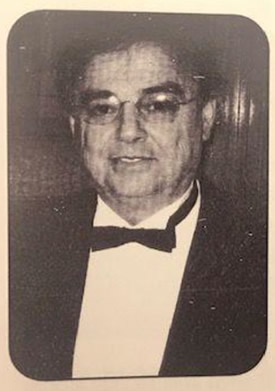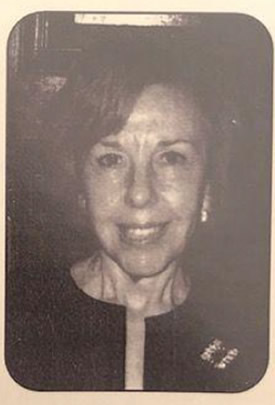Cantor George and Elaine Lindenblatt
 George Lindenblatt’s history spans two continents and a world of diverse experiences. Born in Budapest on the eve of World War II, he is one of the few cantors who can say they were raised in an Orthodox family, trained at a Reform cantorial school, and are serving a Conservative synagogue. With this wide background, he has been able to reach out, with heart, to a wide spectrum of people within the Jewish community. As many at ACI know, he is not only a voice of prayer on the bimah but a trusted counselor.
George Lindenblatt’s history spans two continents and a world of diverse experiences. Born in Budapest on the eve of World War II, he is one of the few cantors who can say they were raised in an Orthodox family, trained at a Reform cantorial school, and are serving a Conservative synagogue. With this wide background, he has been able to reach out, with heart, to a wide spectrum of people within the Jewish community. As many at ACI know, he is not only a voice of prayer on the bimah but a trusted counselor.
For George and his two brothers, with the Nazi invasion of Hungary all vestiges of childhood vanished. After his father Jeno was sent to a labor camp, his mother Piroska scrambled to keep her sons alive, hiding in place after place to evade deportation. The war ended, with Russian communism replacing fascism, and schools reopened – but religion was banned. Jewish children were attacked by antisemitic classmates in the schoolyard – where George, defending his brothers in often bloody encounters, became known as Caesar – a nickname that has stuck. When Jeno’s grocery store was nationalized by the government, he and Piroska took to selling her precious hand-sewn artifacts on street corners.
George found a refuge from all this in sports: as a teen he was named to the National Jr. Water Polo Team and competed throughout the Iron Curtain. In 1956, as the Hungarian Revolution was crushed by Russian tanks, with the borders briefly penetrable though dangerous, George and his brothers, one by one, escaped the country. Last came Piroska and Jeno, with a fourth son born in 1946. The Lindenblatts are considered unique in that the basic family unit survived and made it to the West.
Reuniting with his family in New York in 1959, George earned a Bachelor of Sacred Music degree and cantorial investiture from Hebrew Union College. After stints at a few area synagogues, Cantor George arrived at the Astoria Center of Israel in 1971, accompanied by his wife Elaine and daughters Eve, age 2, and Suzanne, 1-month old. The family has since grown to include a third daughter, Nicole, born in 1977, now married to Paul Kahn; Suzanne’s husband Boaz Gilad and children Noa, Ella, and Ben; and Eve’s husband John Nasetti and children Daniella and Frankie.
In 1990 Cantor George, with Elaine and their girls, returned to Budapest for the dedication of a war memorial, in the courtyard of the Doheny Synagogue, to the 600,000 Hungarian Jews who perished in the Holocaust – among them many relatives. One major stone bears the inscription of George’s grandfather, a leader of the Jewish Underground who disappeared in the last days of the war. Several subsequent trips back always included seeing relatives and visiting cemeteries. The latest visit, in summer 2019, was as Honored Guest of the European Maccabee Games there.
In addition to his cantorial career, George has worked in a successful family business, opened by his brother Robert in 1963. He is still an avid sportsman – American A.A.U. Champion in water polo, multi-time member of the U.S. Maccabee Team to Israel where he also conducted services for the entire American delegation, and a 60-year member of the New York Athletic Club.
Says Cantor George, “I had the best teacher in the world here at ACI: Cantor Richard Cohn,” who he remembers as gifted and demanding and the epitome of Old World hazzanut. “He was not only a wonderful mentor to me, but an amazing administrator of ACI. And I have met some beautiful people here over the years, made friendships that I hope will continue, and memories that will stay with me and my family. For that, I thank all of you, and wish the Astoria Center of Israel a bright future.”
 Elaine Freed was also born on the eve of World War II, but in a vastly different setting: the small town of Southfields, in Orange County, NY. Family lore has it that at the age of 3, when her father took her along to her sister’s second-grade classroom, she stood on a table and sang “Don’t Fence Me In.”
Elaine Freed was also born on the eve of World War II, but in a vastly different setting: the small town of Southfields, in Orange County, NY. Family lore has it that at the age of 3, when her father took her along to her sister’s second-grade classroom, she stood on a table and sang “Don’t Fence Me In.”
That incident hinted at Elaine’s future school years, which included a free-wheeling affinity for the English language – from competing at annual American Legion oratorical contests to writing and delivering her high school salutatory. At Syracuse University, where she earned a B.A. in English, Elaine wrote sorority skits and was an editor on the Daily Orange, covering cultural events. With a master’s degree from Columbia University Teachers College, Elaine next focused on her students’ writing as a high school English teacher on Long Island.
One summer evening, home for the weekend to see her family, Elaine went to Friday evening services at the Monroe Temple. Standing on the bimah was a cantorial student named George Lindenblatt.
Moving to suburban Rockland County, NY, after their marriage, Elaine continued her love affair with writing through a variety of outlets, including the creation of a greeting card company offering poems to order, and as a licensed real estate agent composing tempting descriptions of homes. Her proudest achievement, she says, as president of her B’nai B’rith Women chapter, was running a goods & services auction – with each item described as a song title in the catalogue – which raised record funds for the BBW Children’s Home in Israel.
Exploring many genres of writing, Elaine is a published poet and author of over fifty articles in Hudson Valley newspapers. In her free time (What free time?), she likes to curl up with a good book – preferably one of her three unpublished novels. What has gotten published, to great acclaim, is her book Stop at the Red Apple, a full-length memoir on her family’s restaurant, the Red Apple Rest (SUNY Press, 2014). This launched Elaine on yet another career, creating hundreds of lecture events coast to coast for delighted audiences – the first of which was here at ACI right after the book appeared. It has also given Cantor George a new title, that of Official Book Schlepper. She is starting work on a volume spanning two continents and six generations of George’s family, from ritual artist Aryeh Steinberger to the present.
It is Elaine’s career as an editor, however, that predates and has outlasted all other jobs. Although her editing and proofreading work has run the gamut from newsletters in summer camp to full-time editor of psychotherapy books, she has this to say: “No editorship has lasted as long, or given me as much satisfaction, as the one here at the Astoria Center. Because there are no better congregants, no better people to work with, or for, than right here. The years have flown by, unbelievably nearly forty of them for me as editor, some of the faces have changed, but your wonderful ACI welcome has stayed intact. The ACI Bulletin, as well, has undergone many changes to arrive at its current streamlined version – as last published 11/2020 – designed to entertain as well as inform. With Cantor Cohn’s impeccable work as a role model, I have striven to keep it valid and timely. Despite the catastrophic events of the past year, I trust that we as a congregation will come back even stronger and ready to carry on and enhance the wonderful legacy of our near-century as an historic religious landmark.”